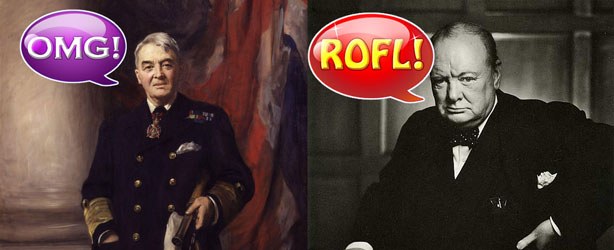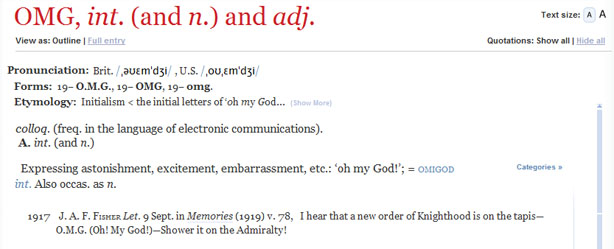
Getting L33t Into The Oxford English Dictionary
Who do you reckon was the first person on record to be sent the phrase OMG in a piece of correspondence? Go on, have a guess. A primordial Usenet poster? A 1980s MUD player? An early mobile phone poser? Nope, it was Winston Churchill. 'O RLY?' We hear you ask. YA RLY; back in World War I, Baron J A Fisher, Lord Admiral of the British Navy, sent a letter to Churchill saying 'I hear that a new order of Knighthood is on the tapis - O.M.G. - Shower it on the Admiralty!' If only the helicopter had been invented, Churchill could have replied with a ROFLcopter.The only reason we know this, however, is because OMG was added to the online Oxford English Dictionary last month, along with LOL, prompting a wave of research by the OED team into the origins of the terms. After over a decade of widespread use in chatrooms and throwaway forum comments, net-speak is finally being accepted as an official part of the English language by esteemed academics.

Even if you ignore the correspondence to Churchill, though, these terms are still pretty ancient in terms of net-speak. In fact, they were commonplace in chatrooms in the 1990s. This got us thinking – what does it take for a new piece of net-slang to be officially recognised as a part of the English language? Where are the borders, and will we ever see l33t and ROFLcopter in the OED? We caught up with the OED's principal editor, Graeme Diamond, to find out.
'The borders are quite indistinct,' says Diamond. He outlines three basic criteria that have to be met by a word in order for it to be considered worthy of inclusion. Unsurprisingly, the first of these is the age of the word.
'The OED is a historical dictionary that includes quotation evidence, which is not only intended to show the first use, but also illustrate technical use and mark particular changes in nuance or sense,' explains Diamond. 'In that respect we're kind of engaged in writing a biography of the word, so we want a word to have had a bit of a life before we include it. Compared to some dictionaries, we're quite cautious about inclusion with respect to timescale, but that's because one of our principles is to be able to authoritatively and objectively reflect on the life of the word.'
What sort of timescale are we talking about here then? 'The minimum really would be five years,' says Diamond, 'and typically it's around the ten year mark, because we want to see if it's going to take on any figurative usage, as well as whether it's going to form any compounds with other words, or maybe take on some phrasal usages.
'If you act too quickly, not only do you run the risk that the word will fizzle out immediately, but you also run the risk of the word developing fairly rapidly over another five years and the OED not reflecting that, which is just about as good as not having an entry at all. We never take anything out, which again is unlike any other dictionaries – it's a permanent record of English as it's used and has been used.' He has a point. After all, we used to say L instead of laugh, but this has since been usurped by LOL, ROFL and so on. Simply L-ing isn't enough anymore, it seems.

MSI MPG Velox 100R Chassis Review
October 14 2021 | 15:04









Want to comment? Please log in.